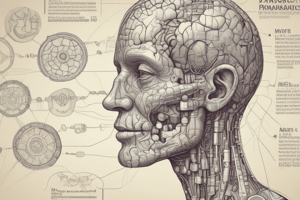Podcast
Questions and Answers
What is the primary therapeutic use of opioids and other analgesics?
What is the primary therapeutic use of opioids and other analgesics?
- Sleep disorders
- Mood disorders
- Psychotic disorders
- Pain management (correct)
What is a common adverse effect of CNS depressants?
What is a common adverse effect of CNS depressants?
- Anxiety disorders
- Respiratory depression (correct)
- Dependence and addiction
- Mood disorders
What is a contraindication for CNS drugs?
What is a contraindication for CNS drugs?
- Mood disorders
- Psychotic disorders
- Pregnancy and lactation (correct)
- Sleep disorders
What is a potential interaction of CNS drugs?
What is a potential interaction of CNS drugs?
What is the therapeutic use of anxiolytics?
What is the therapeutic use of anxiolytics?
What is the primary target of psychopharmacological agents?
What is the primary target of psychopharmacological agents?
Which of the following mechanisms of action involves modifying the release, uptake, or degradation of neurotransmitters?
Which of the following mechanisms of action involves modifying the release, uptake, or degradation of neurotransmitters?
Which class of CNS drugs is used to treat depression and other mood disorders?
Which class of CNS drugs is used to treat depression and other mood disorders?
Which neurotransmitter is involved in regulating movement, reward, and motivation?
Which neurotransmitter is involved in regulating movement, reward, and motivation?
Which of the following is an excitatory neurotransmitter?
Which of the following is an excitatory neurotransmitter?
Which class of CNS drugs is used to treat pain and cough?
Which class of CNS drugs is used to treat pain and cough?
Flashcards are hidden until you start studying
Study Notes
CNS Pharmacology Overview
- The central nervous system (CNS) is the primary target of psychopharmacological agents.
- CNS pharmacology deals with the study of drugs that affect the brain and spinal cord.
Mechanisms of Action
- Neurotransmission: Drugs can modify the release, uptake, or degradation of neurotransmitters.
- Receptor binding: Drugs can bind to specific receptors, altering their activity.
- Ion channel modulation: Drugs can affect the flow of ions across the neuronal membrane.
Classes of CNS Drugs
- Anxiolytics: Reduce anxiety and fear responses (e.g., benzodiazepines).
- Antidepressants: Treat depression and other mood disorders (e.g., SSRIs, MAOIs).
- Antipsychotics: Treat psychosis and schizophrenia (e.g., dopamine antagonists).
- Hypnotics: Induce sleep (e.g., benzodiazepines, zolpidem).
- Stimulants: Enhance alertness and attention (e.g., amphetamines, methylphenidate).
- Narcotics: Treat pain and cough (e.g., opioids).
Neurotransmitters and Their Roles
- Acetylcholine: Involved in memory, attention, and muscle contraction.
- Dopamine: Regulates movement, reward, and motivation.
- GABA: Inhibitory neurotransmitter, reducing neuronal activity.
- Glutamate: Excitatory neurotransmitter, increasing neuronal activity.
- Norepinephrine: Involved in attention, arousal, and sympathetic nervous system activity.
- Serotonin: Regulates mood, appetite, and sleep.
CNS Pharmacology and Therapeutic Uses
- Pain management: Opioids and other analgesics for pain relief.
- Sleep disorders: Hypnotics and sedatives for insomnia and other sleep disorders.
- Mood disorders: Antidepressants and mood stabilizers for depression and bipolar disorder.
- Psychotic disorders: Antipsychotics for schizophrenia and other psychotic disorders.
- Anxiety disorders: Anxiolytics for anxiety and panic disorders.
Adverse Effects and Contraindications
- CNS depression: Respiratory depression, sedation, and coma.
- Dependence and addiction: Physical and psychological dependence on CNS drugs.
- Interactions: Drug-drug interactions, especially with other CNS drugs.
- Contraindications: Certain medical conditions, such as glaucoma, or pregnancy and lactation.
Studying That Suits You
Use AI to generate personalized quizzes and flashcards to suit your learning preferences.




